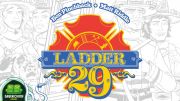The Lady and the Tiger (Jellybean Games) – This bluffing game for two players is inspired by a classic story. There are four door cards. Each round a player is chosen to be the Collector and then both players take a door card, and the other two are set aside. Fourteen clue cards are shuffled and one also placed aside. Then the top three clue cards are flipped over to create the display. Each turn, the Collector takes a card from the display. He may then flip over his door card if he's created a set. A set is four cards that match one of the attributes of his door card. After the Collector takes a card from the display, the other player chooses a display card to discard and, if they want, attempts to guess both the color of the Collector's door card and also whether it shows a lady or a tiger.
Casual Game Crowdfunding: Ladies, Tigers, and Queens

From bluffing and set collection to classic trick-taking, this is the month for card games on Kickstarter, with a wide variety of both mechanics and theme.. This month also brings the first campaign from Restoration Games, a company committed to updating and republishing classic out-of-print board games.
Long Live The Queen (LudiCreations) – In this two player game, the queen has died and you and your opponent must compete for the throne. Or to be the head of a dieselpunk crime empire, as the game comes in two separate themes with unique artwork. At the start of the game, each player chooses which order to lay their characters face down in a row and numbers them 2 through 12. On each turn, a player will roll two dice to determine which characters will be flipped over or have their powers activated. On your turn you may choose to swap any two adjacent characters in order to protect them or move them into positions where their powers will be more useful. You can either win by gaining enough wisdom, force, or prosperity, or simply take out the competition.
5ive: King's Court (David Papp) – In this new strategy card game, players are trying to be the first to collect the five card types in their play area. When you successfully play a card, it goes into your play area. Each card type has an action such as draw another card, block another player's card, or force a player to discard. Some card abilities will require you to discard one or two cards yourself.
Ladder 29 (Green Couch Games) – In this fire-fighting themed trick taking card game, players are dealt 13 cards each round and pass three cards to the player on their left. Each player then chooses a hot spot card which determines how many points you will earn, depending on when you go out in the game, and gives you a unique challenge that only applies to you. The harder the challenge, the more points you can potentially earn.
Stop Thief! (Restoration Games) – It's the first Kickstarter for Restoration Games and they are bringing back (and updating) the 1979 game Stop Thief!, in which players are private investigators competing to arrest a thief. Each player has a stack of movement cards and each card not only lists the number of spaces you can move but also includes a special ability. Each turn, the thief commits a crime on the board, but you don't actually see where the thief is. Instead a sound cue, played on the game's app, gives you a hint as to the thief's location. By studying the board and putting together the sounds you hear each turn, you try to deduce the criminal’s location, move to that spot, and make an arrest!
Get Off My Land! (First Fish Games) – Players are competing to build up their farm and earn the most money, but there's only a limited amount of space and players have to compete with each other to grab it! You can cut down forest and build fences to expand your farm, and purchase farm tiles from the market in order to grow your profits. You can even steal crops from other players, or break their fences to cause mayhem as their animals break loose and trample their fields.
DIG (Julien Charbonnier) – Players dig, explore mines, and hire adventurers in this push-your-luck card game with adorable pixel artwork. Players start by drawing a Dig card, and if possible collecting what is shown on it. You use resources to hire companions. With companions, when you draw a card, rather than collecting anything listed on it, you may choose to start a gallery and place it on the table with your companion. Once you have galleries, on your turn you may choose to dig, in which case you add a card to each of your galleries. Some cards might be bad, so this will always be a risk. Once you have five cards in a gallery, it creates a gem. Once you choose to shut down a gallery, you gain everything in it including any gems. The first player with 10 gems wins the game.
Seeker (Evan Jaroslow) – Seeker is essentially Guess Who? with a more diverse set of people represented on the cards. Players are trying to guess each other’s characters. Each player chooses a deck of characters and lays all the cards face up on the table. You then secretly draw a character card from another deck. This will be the character that other players will be attempting to guess. Each turn you ask an opponent a single yes or no question about their character to try and figure out who it is. If you guess wrong, you're out of the game; if you guess right, you win.
Full disclosure: unless otherwise noted, we have not seen or played any of the above games. Our assessment of each is based on the information given on the crowdfunding project page.












